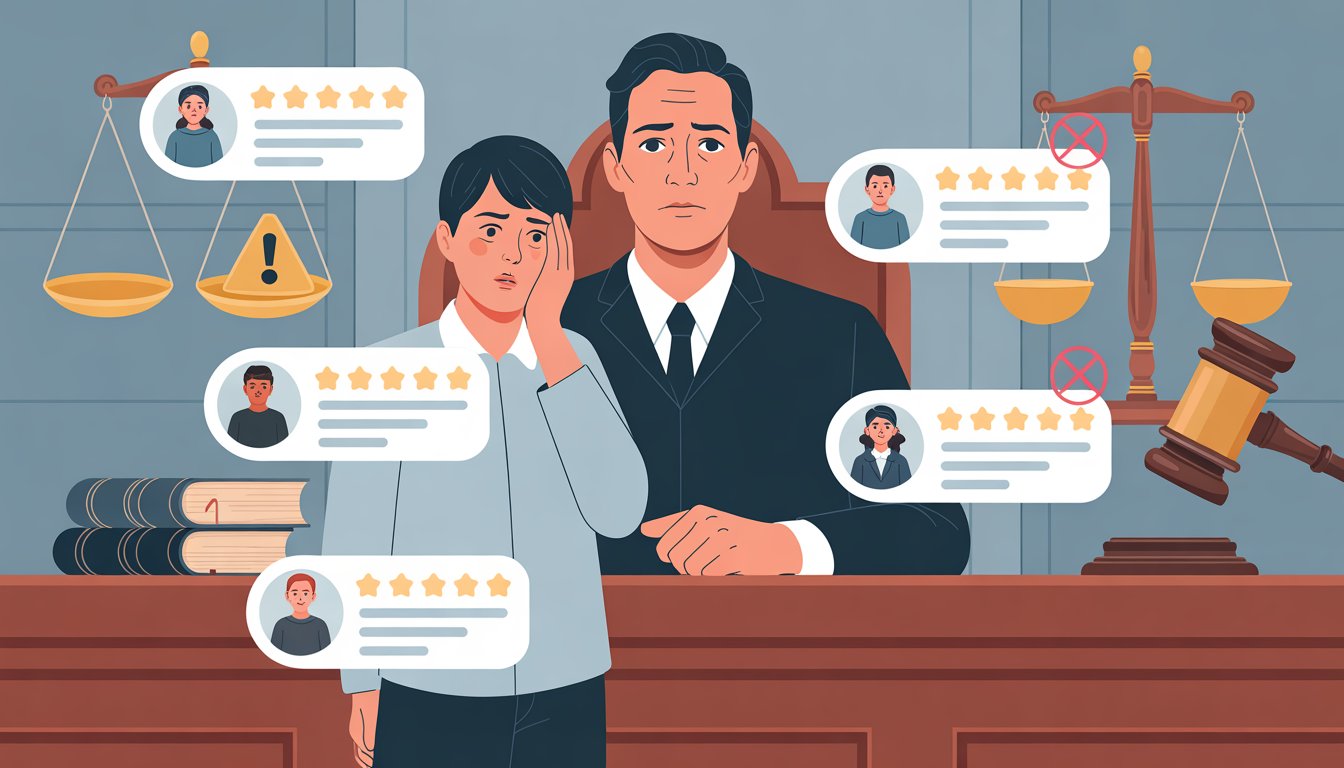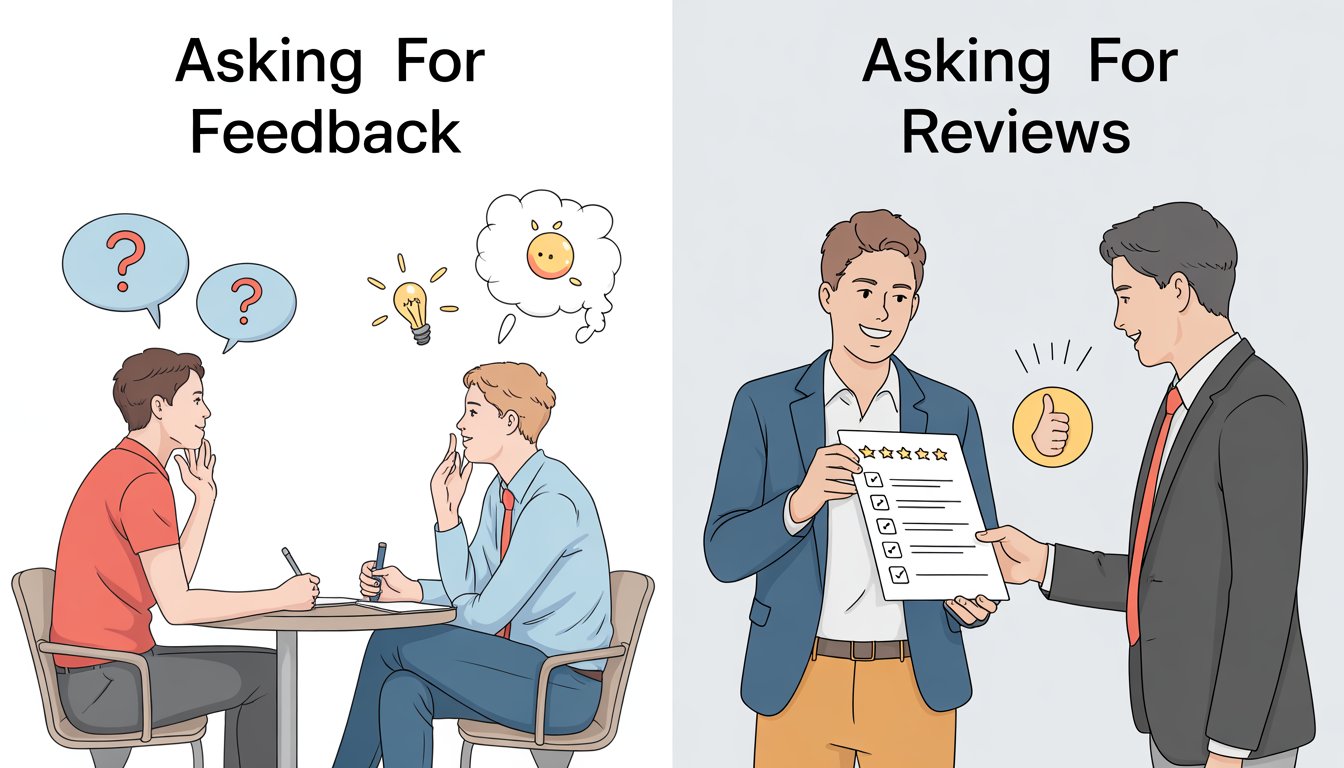When you're managing your business's online reputation, understanding how different review platforms work can make or break your success.
Google, Yelp, and Facebook each handle reviews in unique ways that directly affect how customers find and trust your business.
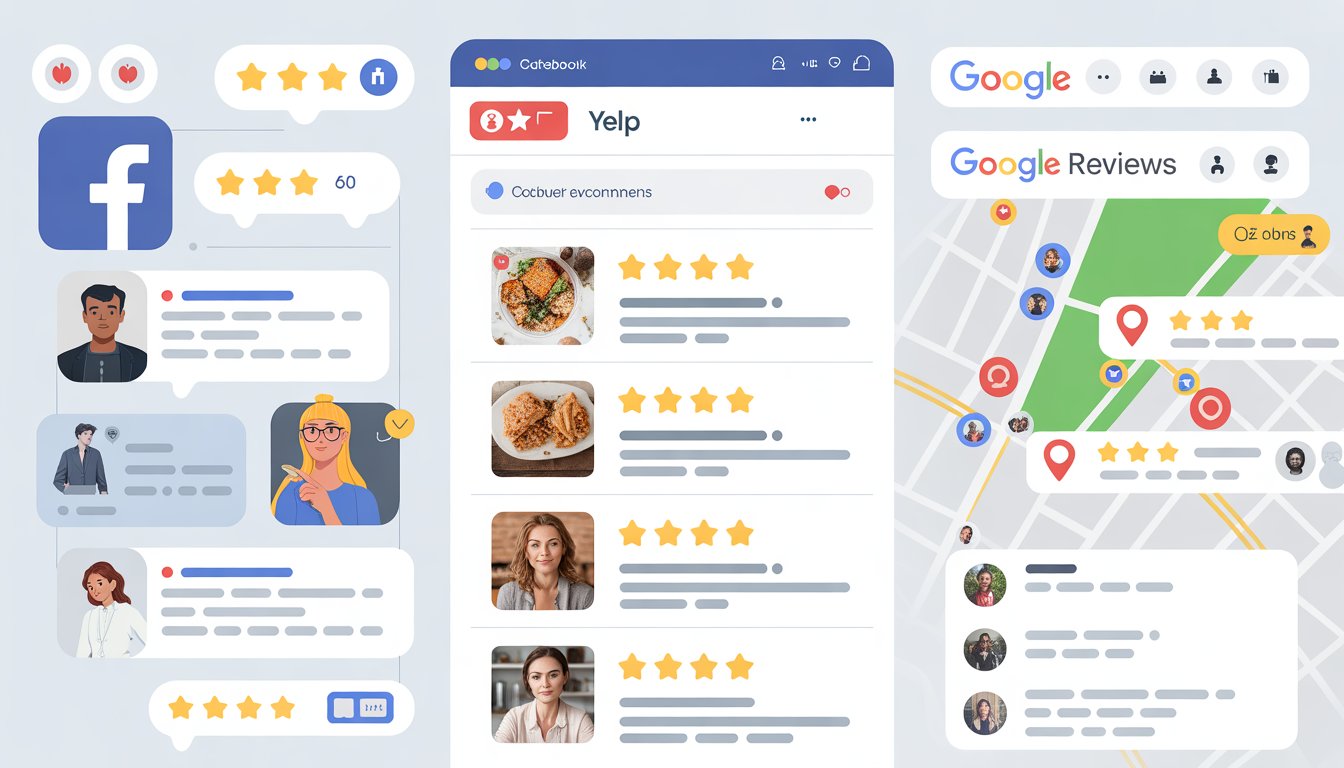
The main differences lie in their rating systems, filtering processes, and how they impact your search visibility - Google shows nearly all reviews and boosts your local search rankings, Yelp filters reviews heavily and focuses purely on review quality, while Facebook uses a simple yes/no recommendation system instead of star ratings.
These differences matter because each platform reaches different types of customers and influences their decisions in distinct ways.
Your approach to managing reviews needs to match each platform's style.
What works on Google might backfire on Yelp, and Facebook's recommendation format requires completely different strategies than traditional star-based systems.
Key Takeaways
- Google displays most reviews and directly improves your local search rankings, while Yelp filters reviews more strictly and Facebook uses yes/no recommendations instead of stars
- Each platform attracts different customer types, with Google serving general searches, Yelp focusing on detailed experiences, and Facebook connecting through social networks
- Your review management strategy must be tailored to each platform's unique rules and user expectations to maximize effectiveness
Overview of Major Online Review Platforms
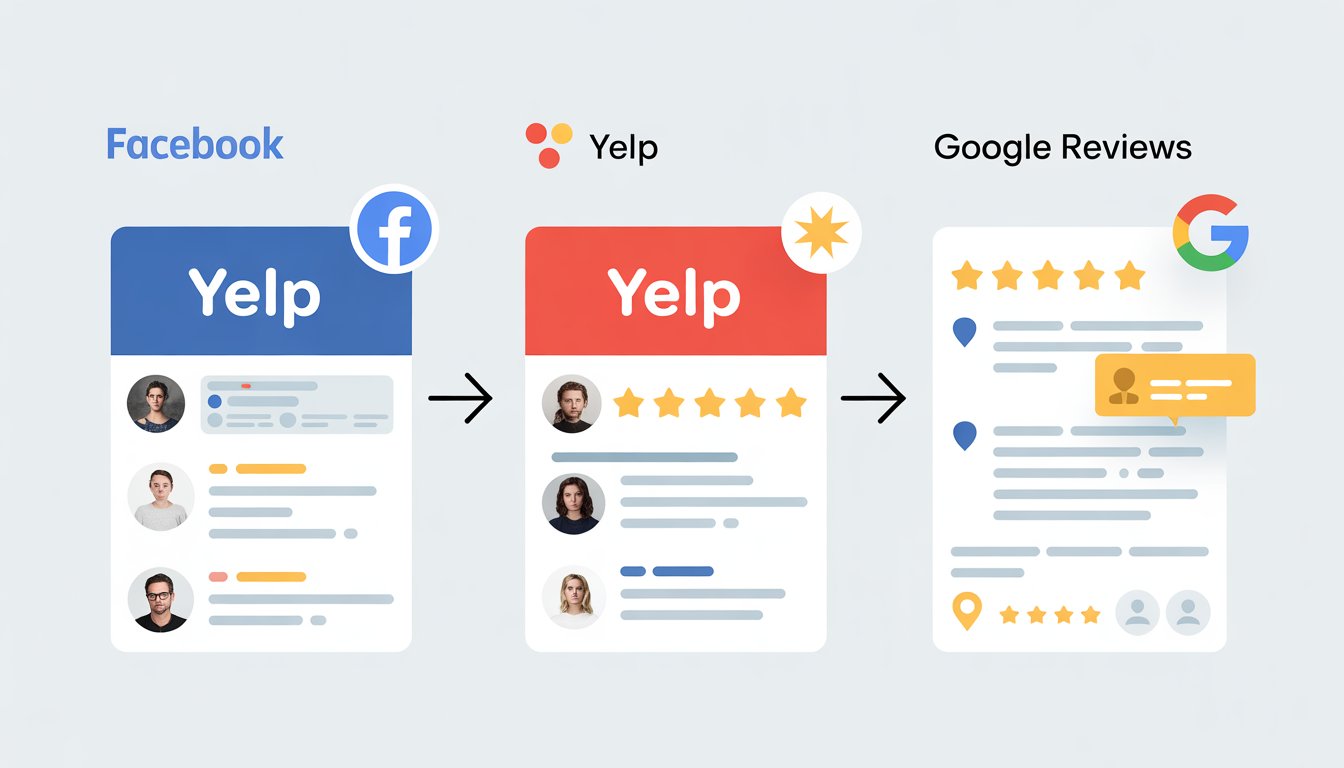
Google dominates with 90% of global search traffic, while Yelp focuses solely on reviews and Facebook uses a simple yes/no recommendation system.
Each platform has different features and reaches different types of customers.
Google Reviews and Google Business Profile
Google Reviews appear in the knowledge panel when people search for your business.
This panel shows contact info, photos, location details, and customer reviews all in one place.
Google lets customers leave reviews without writing any text.
About 50% of Google reviews have no written content.
This makes it easier for customers to leave quick ratings.
Your Google Business Profile connects directly to search results.
When people find your business on Google, they see your star rating right away.
This rating can help or hurt your chances of getting new customers.
Google processes millions of healthcare reviews alone each month.
The platform reaches more people than any other review site because most customers start their search on Google.
Yelp as a Review Platform
Yelp was built specifically for reviews.
Unlike other platforms, Yelp requires customers to write text with every review.
You cannot leave a rating without explaining your experience.
Yelp users put more thought into their reviews.
They often write longer, more detailed feedback because the platform encourages this behavior.
Bing shows Yelp reviews in its search results.
When people search on Bing, they see the top three Yelp reviews for your business.
Bing users are typically between 45 and 54 years old.
Yelp has become its own social community.
Users follow each other and build reputations as reviewers.
This creates a more engaged audience but also means negative reviews can spread quickly.
Facebook Reviews and Recommendations
Facebook changed its review system to focus on recommendations.
Customers now answer a simple question: "Do you recommend this business, yes or no?"
People can still write detailed reviews if they want to.
But the main feature is the binary recommendation system.
This gives you clearer feedback but does not help customers who had mixed experiences.
Facebook shows reaction buttons on reviews.
You can respond with "like" or "love" reactions.
Never use angry reactions, even on negative reviews.
Facebook reaches a different audience than Google or Yelp.
Many customers check Facebook reviews because they trust recommendations from their social network more than strangers.
Review Submission Processes Compared
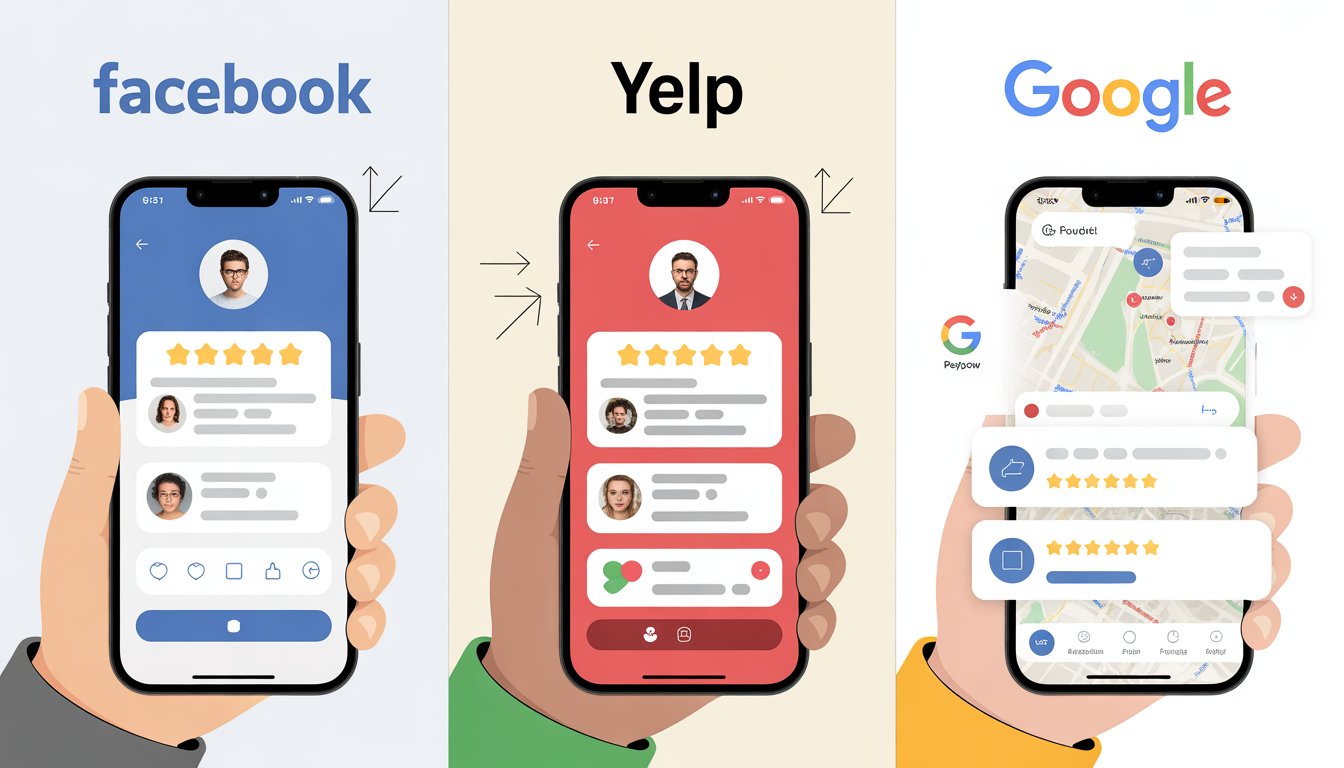
Each platform uses different methods for customers to leave reviews.
Google requires only a Gmail account, while Yelp needs a separate user registration and Facebook uses its recommendation system instead of traditional star ratings.
How Users Leave Google Reviews
Google makes it easy for anyone with a Gmail account to leave a review.
You don't need to create a separate account or go through extra steps.
Customers can leave reviews directly from Google Search results or Google Maps.
They simply click on your business listing and select the review option.
Google displays nearly all reviews that customers submit.
The platform doesn't filter out reviews like some other sites do.
Review requirements:
- Active Gmail account
- Star rating (1-5 stars)
- Optional written review text
Google allows customers to leave just a star rating without any written comments.
This makes the process faster for users who want to rate quickly.
Yelp Review Submission and Filtering
Yelp requires users to create a specific Yelp account before they can leave reviews.
This extra step means fewer people leave Yelp reviews compared to Google.
Yelp's unique requirements:
- Separate Yelp user account
- Written review text required with all ratings
- Community guidelines must be followed
Yelp filters reviews more strictly than other platforms.
The site may remove or hide reviews that don't meet their standards.
Reviews might get filtered out within 48 to 72 hours after being posted.
This filtering system aims to show only reviews from established Yelp users.
Yelp has always required review text along with star ratings.
You can't leave just a star rating like you can on Google.
Writing Reviews and Recommendations on Facebook
Facebook doesn't use traditional star ratings anymore.
Instead, customers answer a simple yes or no question about recommending your business.
The platform asks: "Do you recommend this business?"
Customers choose either yes or no instead of giving 1-5 stars.
Facebook's system includes:
- Binary recommendation (yes/no only)
- Optional written comments
- Reaction emojis (love, like, etc.)
- Must have Facebook account
This yes/no system gives clear answers but doesn't allow middle-ground opinions.
Customers who feel neutral about your service must pick a side.
Facebook users can also react to reviews using emojis.
These reactions range from love hearts to angry faces, adding another layer to customer feedback.
Filtering, Moderation, and Fake Reviews
Google, Yelp, and Facebook each use different approaches to detect and filter fake reviews.
Yelp employs the most aggressive filtering system while Google focuses on automated detection at scale.
Detection and Removal of Fake Reviews
Google relies heavily on machine learning algorithms that analyze hundreds of signals to detect fake content.
The system looks for unusual review patterns and suspicious user behavior across businesses.
Google's automated systems can spot click farms where fake reviews are generated in bulk.
The platform uses typical user pattern data to identify illegitimate content before it reaches users.
Human moderators complement the automated systems.
These analysts handle tasks that algorithms struggle with, like understanding local slang in reviews.
Yelp combines automated recommendation software with human content moderators for every reported issue.
When suspicious activity is flagged, a real person reviews the situation every time.
Facebook uses basic automated detection but provides fewer details about their specific methods compared to Google and Yelp.
Google removed 55 million policy-violating reviews in 2020 alone.
However, local marketing experts report that the success rate for removing fake reviews after they go live is very low.
Yelp's Filter System and Its Impacts
Yelp's recommendation software moves reviews it considers unreliable to a "not currently recommended" section.
These filtered reviews don't count toward the business's overall rating.
The system evaluates reviewer reliability based on how active users are on the platform.
It also looks for solicited reviews and unfairly biased content.
Key impacts of Yelp's filtering:
- Legitimate reviews from new users often get filtered
- Businesses may appear to have lower ratings than on Google
- Reviews can move between recommended and filtered sections over time
Yelp applies Consumer Alerts when it detects manipulation attempts:
- Compensated Activity Alert - for incentivized reviews
- Suspicious Review Activity Alert - for questionable patterns
- Unusual Activity Alert - for media-driven review spikes
Local marketing experts consider Yelp the best platform for combating fake reviews.
However, the strict filtering also removes many legitimate reviews from customers.
Prevalence of Manipulated and Paid Reviews
Google faces significant challenges with fake review manipulation.
Competitors can easily purchase negative reviews to damage businesses, and the removal success rate remains very low.
The platform's scale makes it attractive for review manipulation services.
Businesses can more easily collect high volumes of reviews without heavy filtering concerns.
Yelp has stricter policies against review solicitation.
Businesses that ask customers for reviews may face search ranking penalties or advertising bans lasting at least one year.
Yelp's no-soliciting policy makes it harder for businesses to combat negative reviews naturally.
The platform monitors businesses for repeated violations and maintains ongoing oversight.
Facebook generally has fewer fake review issues due to its social network structure.
Users typically need real profiles connected to friends and family, making fake reviews more difficult to create at scale.
Consequences vary by platform:
- Google may remove content and revoke business profile ownership
- Yelp can ban advertising privileges and apply search ranking penalties
- Facebook relies more on community reporting and basic automated detection
Impact on Business Reputation and Local SEO
Google Reviews carry the most weight for search rankings and visibility.
Facebook and Yelp reviews play different roles in building your overall online reputation.
Each platform affects how customers find and trust your business in unique ways.
Effect of Reviews on Google Business Visibility
Google Reviews directly boost your local SEO rankings more than any other review platform.
When you get more reviews on your Google Business profile, you appear higher in local search results.
Google's algorithm looks at three main factors from your reviews.
It checks how many reviews you have, how often you get new ones, and your average star rating.
Your Google Business listing shows up in the Local Pack when people search for services near them.
Reviews help you rank in these top three spots that appear above regular search results.
Yelp reviews don't directly help your Google rankings.
But they do appear in Bing search results, which gives you extra visibility on that search engine.
Facebook reviews have almost no impact on Google's search rankings.
They mainly help with your social media presence and customer trust.
Reputation Management Across Platforms
You need different approaches for managing reviews on each platform.
Google Reviews require quick responses because they show up in search results right away.
Yelp reviews need more careful handling.
Wait 48 to 72 hours before responding because Yelp might filter out fake reviews during this time.
Facebook recommendations work differently than star ratings.
Customers either recommend your business or they don't.
There's no middle ground like a 3-star review.
Your reputation looks different on each platform.
The same business might have great Google Reviews but poor Yelp ratings.
This happens because different types of customers use each platform.
Managing all platforms takes time but protects your business.
Bad reviews on any platform can hurt your reputation even if your other reviews are good.
Influence of Positive and Negative Reviews
Positive reviews boost your credibility on all platforms but work differently on each one.
Google Reviews help customers find you through search.
Yelp reviews build trust with users browsing that platform.
Negative reviews hurt your business reputation everywhere.
But they damage your Google Business visibility the most because they affect your search rankings.
Response strategies matter for all platforms:
- Google: Respond quickly and professionally
- Yelp: Wait 2-3 days, then respond carefully
- Facebook: Use appropriate reaction emojis and calm responses
Online reviews from all platforms influence customer decisions.
Most people read reviews on multiple sites before choosing a business.
Your review management strategy should focus most energy on Google Reviews.
But don't ignore Yelp and Facebook completely, as they still affect how customers see your business.
Rating Systems and Review Formats
Each platform uses different ways to collect and display customer feedback.
Google relies on a simple star system with optional text, while Yelp focuses on detailed written reviews alongside ratings, and Facebook has moved toward recommendation-based feedback.
Google's 5-Star and Text Review System
Google uses a straightforward 5-star rating system for all business reviews.
You can leave a rating from 1 to 5 stars without writing any text.
The platform also lets you add written comments to explain your rating.
These text reviews can be short or long, depending on what you want to share.
Google displays almost all reviews that customers submit.
The platform doesn't filter reviews based on the reviewer's profile strength or activity level.
Your business gets an overall rating that averages all the star ratings.
This number appears in search results and on your Google Business Profile.
The review format is simple and clean.
Google shows the reviewer's name, rating, date, and any text they wrote.
Yelp's Rating Methodology
Yelp combines a 5-star rating system with detailed written reviews.
The platform expects users to write meaningful text along with their star rating.
Most Yelp reviews are longer and more detailed than other platforms.
Users often treat Yelp as a place to write thorough feedback about their experience.
Yelp filters some reviews based on the reviewer's account history and activity.
This means not all submitted reviews will show up publicly on your business page.
The platform calculates your overall rating using only the reviews that pass through its filter system.
Hidden reviews don't count toward your average score.
Yelp users typically put more thought into their reviews since the platform is designed specifically for reviewing businesses.
Facebook's Recommendation-Based Approach
Facebook has shifted away from traditional star ratings to a recommendation system. Customers now choose whether they recommend your business or not.
The platform asks users a simple question: "Do you recommend [Business Name]?" They can answer "Yes" or "No" instead of picking a star rating.
Users can still add written comments to explain their recommendation. These text reviews work similarly to other platforms.
Facebook displays recommendations as a percentage. Your business page shows what percent of customers recommend you rather than a star average.
The recommendation format appears alongside other Facebook features like photos, posts, and messages. This creates a more social experience than traditional review platforms.
Consumer Trust and Authenticity Concerns
Review platforms use different methods to verify reviewers and fight fake content. Consumer trust varies significantly between platforms based on how they handle fake reviews and display rating information.
Verified Versus Unverified Reviews
Google Reviews allows anyone with a Google account to leave reviews without requiring proof of purchase or visit. The platform accepts star ratings without written text, making it easier to leave quick feedback.
Facebook Reviews requires users to have active Facebook profiles but doesn't verify actual customer experiences. You can leave reviews for businesses without proving you visited or bought something.
Yelp takes a stricter approach to review verification. The platform requires written text with every star rating and uses automated systems to detect suspicious activity.
Yelp's recommendation software filters out reviews that seem unreliable. All three platforms struggle with completely eliminating fake reviews.
Their verification methods create different levels of review quality and trustworthiness.
Consumer Perception of Each Platform
Research shows that 88% of review readers trust reviews with written text more than just star ratings alone. This gives Yelp an advantage since it requires detailed written reviews.
Google Reviews and Facebook Reviews have rating distributions that favor higher star ratings. Yelp shows a more even spread across all star ratings, from one to five stars.
91% of consumers want platforms to warn them about businesses with suspicious review activity. Yelp's Consumer Alerts program addresses this need by flagging questionable review patterns.
Many users view Google Reviews as convenient but less detailed. Facebook Reviews are often seen as social recommendations from friends and family.
Challenges with Review Authenticity
Fake reviews remain a major problem across all platforms. Business owners sometimes pay for positive reviews or ask friends to boost their ratings artificially.
Owner reviews and paid testimonials create trust issues for consumers. Some businesses post good reviews about themselves to attract more customers.
Yelp removed over 56,900 reviews in 2024 through its Media Attention Alert system. This happens when businesses receive unusual review activity not based on real customer experiences.
Google's policy of allowing very short reviews makes it harder to spot fake content. Research found that 32% of Google Reviews lack any written text at all.
The rise of AI tools creates new challenges. 88% of review readers oppose AI-generated reviews, but detecting them requires advanced technology that not all platforms use effectively.
Business Engagement and Response Strategies
Each review platform requires different response approaches and timing strategies. Google Business Profile allows immediate responses, while Yelp reviews need a 48-72 hour waiting period before responding.
Responding to Reviews Across Platforms
Google Business Profile responses should be quick and professional. You can reply to customer reviews immediately without waiting periods.
Yelp requires more caution in your approach. Wait 48 to 72 hours before responding because reviews may get filtered out automatically.
Exercise extra care with your wording since Yelp users can be more reactive to business responses. Facebook reviews work differently since they use a recommendation system instead of star ratings.
You can react with emojis before writing responses. For positive reviews on all platforms:
- Thank customers by name when possible
- Keep responses brief but personal
- Mention specific services they praised
For negative reviews:
- Stay calm and professional across all platforms
- Address specific concerns mentioned
- Offer to resolve issues privately when appropriate
Dealing with Negative and Positive Feedback
Positive reviews need acknowledgment but don't require lengthy responses. A simple thank you with mention of the specific service builds good relationships.
On Facebook, use "like" or "love" reactions for positive reviews. Use "love" specifically when customers mention loving your service in their recommendation.
Negative reviews need careful handling on each platform. Google allows straightforward professional responses.
Yelp users may respond aggressively to business replies, so be extra diplomatic. Never use angry reactions on Facebook negative reviews.
Consider not reacting at all to negative Facebook recommendations. Address customer concerns directly but avoid getting defensive.
Offer solutions and invite further discussion through private channels when needed.
Managing Review Profiles for Branding
Keep your business information consistent across Google Business Profile, Yelp, and Facebook. Use the same business name, address, and phone number on every platform.
Upload quality photos regularly to all three platforms. Google and Yelp allow multiple business photos, while Facebook focuses on your main profile and cover images.
Monitor your profiles weekly for new customer reviews. Set up notifications so you can respond within reasonable timeframes.
Your response style should match your brand voice but adapt to each platform's culture. Google responses can be more formal, while Facebook allows slightly more casual language.
Track your average ratings across platforms and focus extra attention where ratings are lowest.
Frequently Asked Questions
Each review platform has unique features that affect how customers leave reviews and how businesses respond. These differences impact everything from user behavior to business visibility across different audiences.
What factors contribute to the differences between Yelp and Google reviews?
Yelp focuses on detailed, community-driven reviews where users often write longer posts with more specific feedback. The platform filters reviews based on reviewer authority and activity levels.
Google displays nearly all customer reviews without heavy filtering. Reviews on Google tend to be shorter and more straightforward.
Yelp users typically seek out the platform specifically to read or write reviews. Google reviews happen more naturally since people encounter them during regular searches.
Can businesses respond to reviews differently on Facebook compared to Google?
Facebook makes it easier for businesses to respond to reviews because you use the same interface you already know. You can continue conversations naturally with customers who leave feedback.
Google requires you to log into the correct business account to respond. The conversation options are more limited than Facebook's social networking features.
Facebook responses feel more personal and social. Google responses tend to be more formal and business-focused.
How do the reviewing guidelines on Yelp differ from those on Google?
Yelp has stricter guidelines about review quality and reviewer credibility. The platform removes reviews from users it considers less reliable or active.
Google accepts most reviews as long as they follow basic guidelines. They don't filter reviews based on how established the reviewer is on the platform.
Yelp encourages longer, detailed reviews with specific examples. Google accepts both short and long reviews without preference for length.
What is the impact of Google reviews versus Facebook reviews on business visibility?
Google reviews appear directly in search results and affect your business's local search ranking. They show star ratings that people see without clicking anywhere.
Facebook reviews help with visibility on the social platform where 68 percent of consumers search for businesses. Your Facebook page with reviews also appears in regular search engine results.
Google reviews have more direct impact on search engine optimization. Facebook reviews help build your social media presence and community engagement.
In what ways do user demographics influence the nature of reviews on Yelp vs. Google?
Yelp users actively seek out the platform to research businesses before visiting. They tend to write more detailed reviews and include photos.
Google reviewers often leave feedback after using Google Maps or searching for a business. Their reviews tend to be shorter and focus on basic experiences.
Yelp attracts users who enjoy writing detailed reviews for the community. Google attracts everyday users who want to share quick feedback.
What are the pros and cons of using Facebook for customer reviews as opposed to Google?
Facebook reviews are easier for customers to leave because they're already logged into the platform. Studies show 47 percent of consumers use Facebook to recommend local businesses.
Google reviews have better search visibility and directly impact your local search rankings. Only 25 percent of consumers use Google specifically for recommendations.
Facebook lets you build ongoing relationships with reviewers through social features. Google reviews focus more on providing information to potential customers.
Facebook reviews may not reach people who don't use social media. Google reviews reach anyone who searches for your business online.

